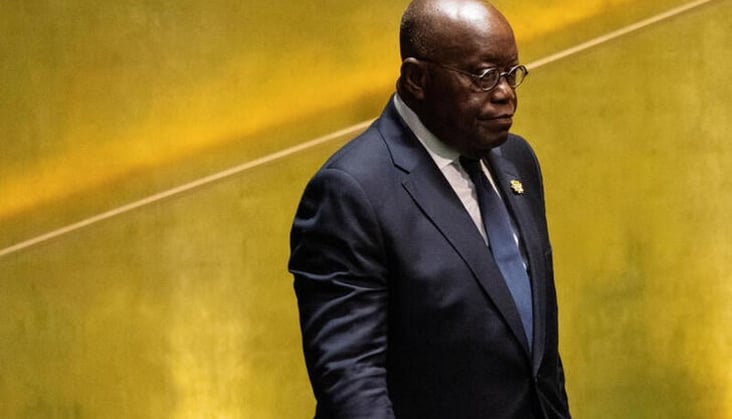By Chinasaokwu Helen Okoro
Bill The decision by Ghana’s apex court is expected to shift the focus to outgoing President Nana Akufo-Addo, who must now decide whether to sign the bill into law before his term ends on 6 January 2025.
The Supreme Court of Ghana has unanimously dismissed two legal challenges seeking to prevent the passage of the controversial anti-LGBTQI bill, clearing the way for its potential enactment.
“Upon hearing the parties orally, we come to the unanimous decision that the plaintiff writ does not properly invoke the exclusive jurisdiction of this court,” Justice Avril Lovelace-Johnson, president of the seven-member Supreme Court panel, said in the ruling on Wednesday.
It will be premature for this court to exercise its interpretive and enforcement jurisdiction to intervene.
Consequently, the action fails. Until there is presidential assent to the bill, there is no act of which the Supreme Court will use its supervisory jurisdiction to overturn.
The plaintiff’s action is therefore dismissed.”The decision is expected to shift the focus to outgoing President Nana Akufo-Addo, who must now decide whether to sign the bill into law before his term ends on 6 January 2025.
If he opts not to act, the incoming President John Mahama, who supported the bill while in opposition, will face the decision.“We are disappointed. This will embolden people to trample on the rights of [the] minority in society. We will study the judgement and advise ourselves accordingly,” says Takyiwaa Manuh, an emerita professor of African Studies at the University of Ghana, who has led civil society to kick against the bill.
A controversial bill Officially named the ‘Human Sexual Rights and Family Values Bill’, the legislation has sparked fierce debate since its passage in February. The bill criminalises LGBTQ relationships, with penalties ranging from six months to three years in prison, and imposes even harsher sentences of three to five years for promoting or sponsoring LGBTQ activities.
The bill has drawn widespread international condemnation from organisations such as the United Nations and foreign governments, including the United States and the United Kingdom, which have urged Ghana to respect human rights.
Despite this, the legislation enjoys strong domestic support in the deeply conservative West African nation, where influential Christian, Muslim, and traditional leaders have backed the bill.
A coalition of MPs also overwhelmingly approved it in February.Legal and economic stakesThe lawsuits filed by broadcaster Richard Dela Sky and academic Amanda Odoi challenged the constitutionality of the bill and sought to prevent its transmission to President Akufo-Addo for assent.
Sky argued that the bill violated multiple provisions of Ghana’s 1992 Constitution, including protections against discrimination and guarantees of personal freedom. Among his eight reliefs, he claimed that the Speaker of Parliament had breached constitutional provisions by passing a bill that imposes charges on the Consolidated Fund.Odoi, on the other hand, sought a restraining order to stop parliamentary leaders from forwarding the bill to the president.
Both cases were dismissed by the court for failing to properly invoke its jurisdiction. The court ruled that intervening in the legislative process before presidential assent would be premature and outside its purview.The bill’s passage has also raised significant economic concerns.
Ghana’s finance ministry has warned that the country risks losing $3.8bn in World Bank financing as a result of the bill.Outgoing President Akufo-Addo has refrained from approving the bill, citing the legal challenges.
However, with the court’s dismissal of the cases, he may now face mounting pressure from both supporters and detractors to act before leaving office.


